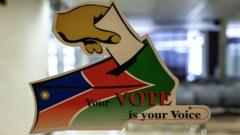Recent elections in Africa reveal a dramatic voter backlash against ruling parties, with significant losses for long-standing incumbents in Namibia, Botswana, Mauritius, and Senegal. The emerging trend showcases a populace growing increasingly intolerant of corruption and economic mismanagement, indicating a potential shift in power dynamics across the region.
Shift in African Politics: Voters Rebel Against Longstanding Ruling Parties

Shift in African Politics: Voters Rebel Against Longstanding Ruling Parties
A wave of electoral discontent sweeps across sub-Saharan Africa, signaling a shift towards opposition-led governance as anger over corruption and economic woes drives change.
Amid ongoing challenges driving discontent in sub-Saharan Africa, a notable electoral upheaval is taking root. Voters are expressing their frustration with ruling parties, leading to unexpected outcomes in several countries. Namibia's Swapo party, which has enjoyed over three decades of governance, recently saw its power weakened despite its candidate Netumbo Nandi-Ndaitwah securing the presidency with 57% of the vote. However, opposition parties are voicing dissatisfaction, contesting the election's legitimacy after reporting logistical issues and irregularities.
The situation in Namibia is not an isolated incident; it reflects a broader trend of governmental setbacks across the African continent. In Botswana, for instance, the long-dominant Botswana Democratic Party (BDP), in power since 1966, faced a historic defeat in October, plummeting from 38 parliamentary seats to a mere four. Similarly, in Mauritius, the ruling Alliance Lepep coalition saw its representation drastically diminish, securing only 27% of the vote and just two parliamentary seats.
Following in these footsteps, Senegal also marked a significant political shift when opposition leader Bassirou Diomaye Faye, previously jailed under allegations of state oppression, won the presidency following increased pressure for his release. The government’s candidate received only 36% of the votes.
Even in nations where incumbents managed to maintain their position, such as South Africa's African National Congress (ANC), the results were disheartening. The ANC fell below 50% of the vote for the first time since apartheid ended in 1994, ushering in a coalition government.
Recent months have seen a transformation in the political landscape as incumbents are increasingly held accountable by voters with a newfound resolve against longstanding corruption and economic struggles. High costs of living paired with public anger have fueled protests and political challenges, echoing global trends in nations like the UK and the US.
As opposition parties adapt and collaborate more effectively—employing methods to enhance vote protection and consolidate their efforts—the possibility of more shifts in power remains real, particularly looking ahead to upcoming elections in Ghana and Malawi.
This significant electoral turbulence suggests that African democratic resilience may hold more promise than previously noted. As civil society groups, oppositional entities, and engaged citizens demand accountability from their governments, the region exemplifies how multiparty politics can flourish even amidst global democratic challenges. With increased attention from international allies, sub-Saharan Africa's recent victories against authoritarianism may illuminate a path forward for democratic movements worldwide.


















